

Over the last year, Ukraine’s indicators in the Corruption Perceptions Index (CPI) increased by 3 points. With 33 points out of maximum 100, we ranked 117th out of 180 countries in the CPI list. Next to us in the ranking are Egypt, Africa’s Eswatini (Swaziland), Nepal, Sierra Leone, and Zambia — all of these countries also scored 33 points in CPI 2020.
Among the neighbors, the closest to Ukraine is Moldova — 34 points and 115th place (+2 points). The European autocracies such as Belarus (47 points, 63rd place) and Russia (30 points, 129th place) also improved their indicators compared to last year. Russia remains the only country that is behind Ukraine among its neighbors. The indicators of Hungary and Romania did not change — both countries scored 44 points each and shared 69th place. At the same time, last year’s leaders of the СРІ among our neighbors lost their points: Slovakia — 1 point, Poland — 2 points.
The top ten of the CPI has not changed over the year, the absolute leaders of the list are New Zealand and Denmark — they added one point each and now have 88 out of 100. The only leading country to lose in the Index was Finland — minus 1 point. However, with 85 points, as last year, it ranks 3rd along with Singapore, Sweden, and Switzerland.
The bottom of the list is occupied by countries with the long-lasting unstable political situation, military conflicts, and uneven control of the government over the territory — Syria (14), Somalia (12), and South Sudan (12).
Compared to the previous year, the Maldives gained the most points (+14) (43 points, 75th place). After Ibrahim Mohamed Solih became President of the country in 2018 as a result of democratic elections, the Maldives radically changed its political vector — the country began radical reforms, and in February 2020 it returned to the Commonwealth.
Armenia also continued its anti-corruption progress, and as last year, improved its score by 7 points. This happened in particular due to the adoption of the Anti-Corruption Strategic Plan for 2019-2022 by the Ministry of Justice of Armenia, the relaunch of the local equivalent of the NACP, and the reduction of high-profile cases of corruption. Such jumps in the СРІ indicate the series of reforms that have been carried out in the country in recent years.
With 33 points out of 100 possible, we ranked 117th out of 180 countries in the CPI list. Next to us in the ranking are Egypt, Africa's Eswatini (Swaziland), Nepal, Sierra Leone, and Zambia.
Why has Ukraine’s score grown?
Ukraine’s assessment was formed based on 9 different surveys, and in all of them, Ukraine’s indicators either did not change or increased in comparison with СРІ-2019.
The largest increase is observed in the data of Global Insight Country Risk Ratings — by 13 points. This study examines the risks of people/companies in the country facing bribery or other corrupt business practices, from large contracts to day-to-day work.
The CPI can show the actual changes across the country rather slowly — sometimes it takes several years. Thus, the score of 2020 indicates the positive development that has occurred in Ukraine in the last two years, especially until the spring of 2020, and does not take into account the resonant events of recent months.
In general, an improvement or deterioration of 3 points is not considered a statistically significant result. This means that such a score should be perceived as the result of several years as evidence of planned changes in the fight against corruption in the country.
Ukraine’s index in 2020 has improved due to launching of the High Anti-Corruption Court with appropriate jurisdiction and restart of the National Agency on Corruption Prevention. The restart of the NACP began with the election of a new head of the Agency with the participation of the representatives of the international community.
It is these events that have finally “completed the chain” of creating the anti-corruption infrastructure in Ukraine that previously could only partially work.
The positive results of Ukraine in 2020 were also affected by the anti-corruption changes introduced during the “turbo-mode” of the Verkhovna Rada of the IX convocation. These are, in particular, the new legislation on the right to exercise covert investigative actions independently for the NABU, returning responsibility for illicit enrichment, strengthening of protection of whistleblowers, and necessary changes in the field of public procurement. The improvement of our position was also influenced by small-scale privatization, anti-corruption initiatives of the Honcharuk government, and the long-awaited test launch of the NACP electronic register of political parties’ accountability.
All these changes were undoubtedly reflected in the Corruption Perceptions Index of Ukraine. But over the past year, risks have emerged that could significantly push us back in the fight against corruption. In particular, the delay in the implementation of full-fledged judicial reform is even more poignant today.
Throughout 2020, there was constant pressure on anti-corruption institutions: attempts to dismiss the NABU director in circumvention of the law, interference by the authorities and individuals in the investigation and trial of high-profile corruption cases, in particular through the involvement of the judiciary. At the end of the year, the crisis of constitutional justice occured, which was accompanied by the inability of the state leadership to fully overcome it.
Besides, there were also attempts to disrupt and level anti-corruption achievements in the field of public procurement. In particular, both the government and the Parliament are trying to amend the legislation and implement the localization in public procurement that, according to the research of experts, drives the domestic economy to a dead end and contradicts Ukraine’s international obligations.
The issue of attacks on activists became even more urgent in 2020. Four years in a row we have been observing the systemic pressure on civil society, which has moved from the regional level to the national, but the guilty are often not punished.
Thus, if we do not stop all these negative processes and trends, next year our indicators in the Corruption Perceptions Index may change significantly and drastically.
Ukraine's assessment was formed based on 9 different surveys, and in all of them, Ukraine's indicators either did not change or increased compared to СРІ-2019.
In early 2020, Transparency International Ukraine provided 5 recommendations, which could improve Ukraine’s performance in the CPI. As the year’s end, none had been fully implemented, two had been partially implemented and three had not been implemented at all.
Recommendations the authorities partially implemented (2)
Improve the effectiveness of political corruption prevention systems
On July 16, the NACP launched the long-awaited trial operation of the electronic register of reports of political parties Politdata. As of the beginning of 2021, the register has not been put into commercial operation, it is yet to be launched.
The effectiveness of state control over the financing of political parties still has some gaps. For example, the downside is that the analysis of the financial statements of candidates/parties in local elections (sometimes not even published and with no full access to them by the NACP) is entrusted to territorial election commissions, which consist of candidates from the political parties themselves. The effectiveness of state control is weakened by the fact that reports of different types are submitted to different state bodies in different ways. And the deadlines for reporting by parties to the NACP are constantly being extended due to the ongoing quarantine.
Liability for violations in this area also remains unbalanced. For failure to submit election reports, one can expect fewer penalties than for inaccurate reporting. There was no improvement in accountability, such as withdrawal from the election campaign or an increase in fines.
Introduce an open and accountable process of public property privatization
Due to small-scale privatization, the Ukrainian budget received UAH 3.03 billion in 2020. This is 6 times more than planned. Such achievements became possible due to the restructuring of the process of preparation of objects for auctions, the proactive position of the Ministry of Economic Development and Trade, and the State Property Fund of Ukraine. It is a question of establishing open virtual rooms of the data on the facilities put up for sale which have replaced inefficient paper “Bulletin of privatization”.
However, the significant legislative changes, which would have a positive impact on the privatization process, never happened. In addition, in the spring of 2020, holding auctions for the privatization of large facilities was banned by the Parliament until the end of quarantine. Although the SPFU continued to prepare such facilities for privatization (this process lasts 11-12 months for each company), the ban postponed auctions for facilities already ready for sale, including the United Mining and Chemical Company.
The number of state-owned enterprises is still excessive. Only some of them work and are profitable, while most are unprofitable or even exist only on paper. During 2020, significant progress in the disclosure of information on the activities of SOEs did not happen. This is partly because state-owned enterprises are managed by more than 90 different authorities.
The only portal where you can find aggregate information about the activities of most state-owned enterprises is the Portal of State-Owned Enterprises of Ukraine developed jointly with the Ministry for Development of Economy, Trade, and Agriculture of Ukraine Prozvit. The information there, however, is incomplete and is often submitted by management entities with a long delay.
Not implemented (3)
To form an independent and professional judiciary
This recommendation is an extremely high priority and, unfortunately, repetitive. In fact, no progress has been made on judicial reform in two years.
Last year, the President and Parliament tried several times to start a painful process of change. And although the deputies adopted the first Presidential draft law in 2019, on March 11 the Constitutional Court of Ukraine declared key provisions of that law unconstitutional. The next attempt to launch the reform was also initiated by the President through Draft law 3711. But it has been mercilessly criticized by the Venice Commission and the expert community and is awaiting finalization and second reading.
High integrity composition of the High Council of Justice, elected with the participation of the international community and community experts, remains a current requirement of the IMF, and a recommendation of the Venice Commission and the public. However, this did not in any way affect any steps towards reformatting this body. The composition of the High Qualification Commission of Judges is also awaiting updating, but it is unknown when such a restart will finally take place and whether best practices in tendering procedures will be taken into account.
Ensure the independence and capacity of anti-corruption bodies
The threat to independence and the strengthening of political influence on anti-corruption institutions have been relevant since the beginning of the anti-corruption reform, but these issues became especially acute in 2020.
Thus, last year the MPs only on the third attempt managed to appoint their representatives to the board on the selection of the head of the Specialized Anti-Corruption Prosecutor’s Office. Unfortunately, some of the elected members of the commission from the Parliament do not meet the requirements of the law and have no proven experience in anti-corruption activities. And only in January 2021 submission of documents from candidates began. We emphasized the need for transparent and fair competition for the selection of the SAPO head in the recommendations for 2019.
At the same time, the issue of appointing a new head of the SAPO is becoming more relevant with each regular high-profile anti-corruption investigation. Due to the imperfection of the law on the prosecutor’s office and limited powers of the SAPO acting head, the Prosecutor General Iryna Venediktova had the opportunity to repeatedly interfere in the course of high-profile NABU-SAPO investigations undermining the independence of these institutions. Thus, the Prosecutor General did not miss the opportunity to study and even influence the proceedings in the high-profile corruption cases of 2020 (cases against Maksym Mykytas, Oleh Tatarov, Oleh Bakhmatiuk, etc.).
Independence and impartiality of the State Bureau of Investigation in 2020 also became more relevant. Following the relevant legislative changes, the SBI is under significant control of the President, although this is contrary to the Constitution of Ukraine. A series of debatable actions and scandals primarily characterized the work of the Bureau last year.
It is worth mentioning that the decision of the Constitutional Court of Ukraine on the powers of the President to establish the National Anti-Corruption Bureau of Ukraine, to appoint its chairman, to form a public council. This decision was a significant institutional blow to the NABU, but attempts to get out of this situation still failed. Unfortunately, the Verkhovna Rada failed to amend the NABU law within three months and clearly define a new procedure for appointing its leadership.
Not a small blow to the anti-corruption system, in general, was the decision of the CCU of October 27, 2020 which canceled a significant part of anti-corruption reform. Thus, precisely because of the recognition of Article 366-1 of the Criminal Code of Ukraine as unconstitutional, the NABU was forced to close dozens of cases concerning lies in declarations and their deliberate non-submission. The HACC also had to close cases and even overturn sentences under this article.
It is worth noting that thanks to the same decision of the CCU in 2020, the authorities needed to re-process our recommendation for 2019, which concerned the NACP. For example, The Verkhovna Rada had to pass a law again on the restoration of the powers and rights of the Agency, their respective features in relation to judges and judges of the CCU, etc.
No fewer problems are observed with the independence and full-fledged work of the Asset Recovery and Management Agency. In 2020, MPs did not vote for the much-needed legislative changes, which aim to improve the implementation of functions for the management of assets seized in criminal proceedings by the ARMA (Draft law 3335). Instead, the committee supported an alternative draft law (No 3335-1), which provides for a significant narrowing of the ARMA’s capacity to manage the seized property and does not solve the Agency’s existing problems. At the same time, the ARMA has remained without a leader for more than a year, because during this time the Parliament has not managed to decide on its representatives to the relevant selection board.
Under such conditions, the question of an independent audit of anti-corruption bodies was not on the agenda at all, which is bound to cause concern. After all, a full-fledged independent external audit can clearly answer the question of the effectiveness of the bodies and eliminates all allegations about the need for an anti-corruption system in general.
To deprive the Security Service of Ukraine of its powers in the sector of economic corruption crime prevention
This recommendation of Transparency International Ukraine is also not implemented for the second year in a row. In its current form, the Security Service of Ukraine has uncharacteristic functions. It is primarily about investigating economic and corruption crimes.
There is a draft law in the Parliament, designed to finally implement such a reform. However, the Service itself and its head support the preservation of powers in their current form, as Ivan Bakanov has repeatedly stated publicly.
The future of the Bureau of Financial Investigations promised by the authorities also remains uncertain. In September 2020, the relevant law was passed in the first reading, but the draft law is not ready for the second reading. We should emphasize here that the establishment of a new politically independent agency to investigate serious economic and financial crimes is one of the requirements for obtaining the EU macro-financial support.
In early 2020, Transparency International Ukraine provided 5 recommendations, which could improve Ukraine's performance in the CPI. As of year’s end, none had been fully implemented, two had been partially implemented and three had not been implemented at all.
Recommendations for 2021 to reduce corruption
A number of changes are needed in 2021 to reduce corruption and increase public and business confidence in the government.
Introduce transparent and accountable management of public assets and guarantee further development of the procurement sector.
- Prepare facilities for privatization. In particular, to amend the Law of Ukraine “On Privatization of State and Communal Property,” namely to repeal the rule prohibiting auctions for the sale of facilities for the period of quarantine restrictions.
- To disclose information about state-owned facilities. Develop a new Register of state-owned facilities as an accessible and convenient tool for visualization and search of facilities. Change the legal framework in the field of management of state property.
- Improve the areas of procurement in line with international commitments. Minimize the risks of passing the draft laws that contradict the Law of Ukraine “On Public Procurement” and/or expand the list of exceptions from this law’s scope. Ensure effective control and monitoring of procurement by the State Audit Office.
Ensure the independence and capacity of the anti-corruption infrastructure.
- Conduct transparent and politically impartial competitive selection of heads of anti-corruption institutions. Currently, the SAPO and the ARMA do not have heads for a long time, which significantly limits their effectiveness. In a year a new competition for the position of the NABU director should begin, but the provisions of the law that regulate this process were partially declared unconstitutional by the CCU.
- Ensure an effective checks and balances system for the independence of anti-corruption infrastructure from administrative and political pressure. Over the past year, many draft laws have been submitted that contradict the principle of separation of powers enshrined in the Constitution. The Prosecutor General and the President’s Office have repeatedly undermined the independence of anti-corruption institutions.
- Provide anti-corruption bodies with the necessary legislative tools for the full implementation of their functions. Introduce a balanced criminal liability for lying in declarations and intentional failure to submit a declaration that would provide a sanction in the form of imprisonment.
Form a professional and independent judiciary.
- Elect a fair composition of the High Council of Justice with the participation of the international community and public experts. This is a requirement of the IMF and a recommendation of the Venice Commission and the public. It is also necessary to update the composition of the High Qualification Commission of Judges, taking into account the best practices of conducting competitive procedures.
- Eliminate the Kyiv District Administrative Court notorious for its odious decisions, which are difficult to call legitimate. Its activities have nothing to do with the administration of impartial and fair justice. Certain categories of cases considered by this court must be transferred to the Supreme Court or a newly established administrative court to hear cases at the national level.
- Initiate a new comprehensive draft law considering all recommendations from the Venice Commission on the reform of the Constitutional Court and consider it soon. For example, it is necessary to improve the judges’ selection system and ensure fair and open competition. Currently, none of the draft laws solves the complex problem and does not fully take into account the recommendations of the Commission.
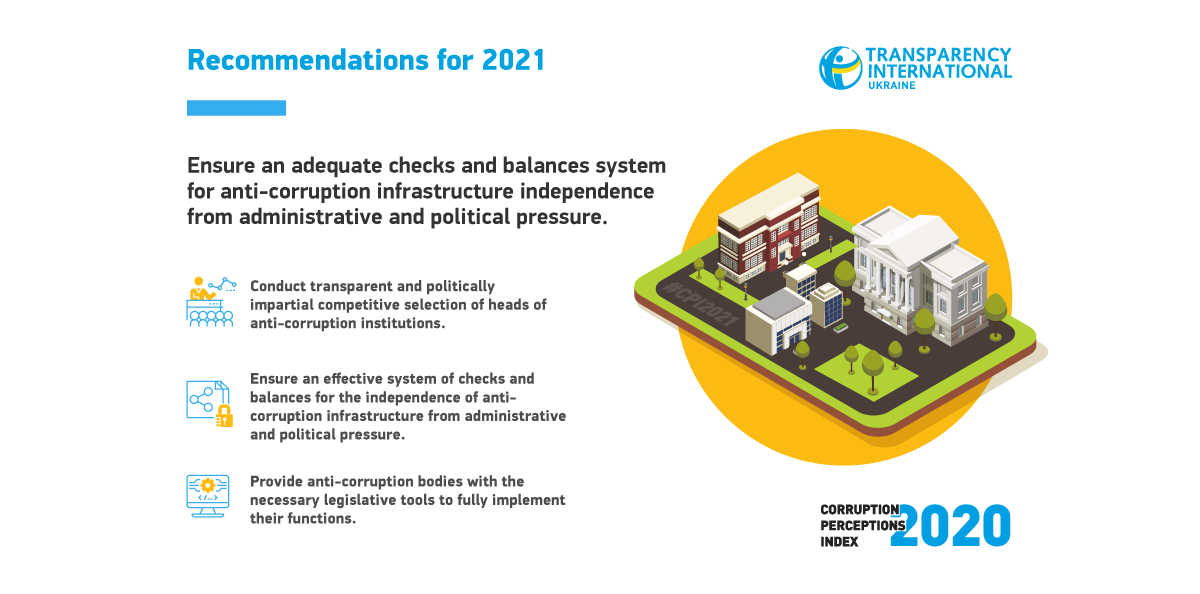
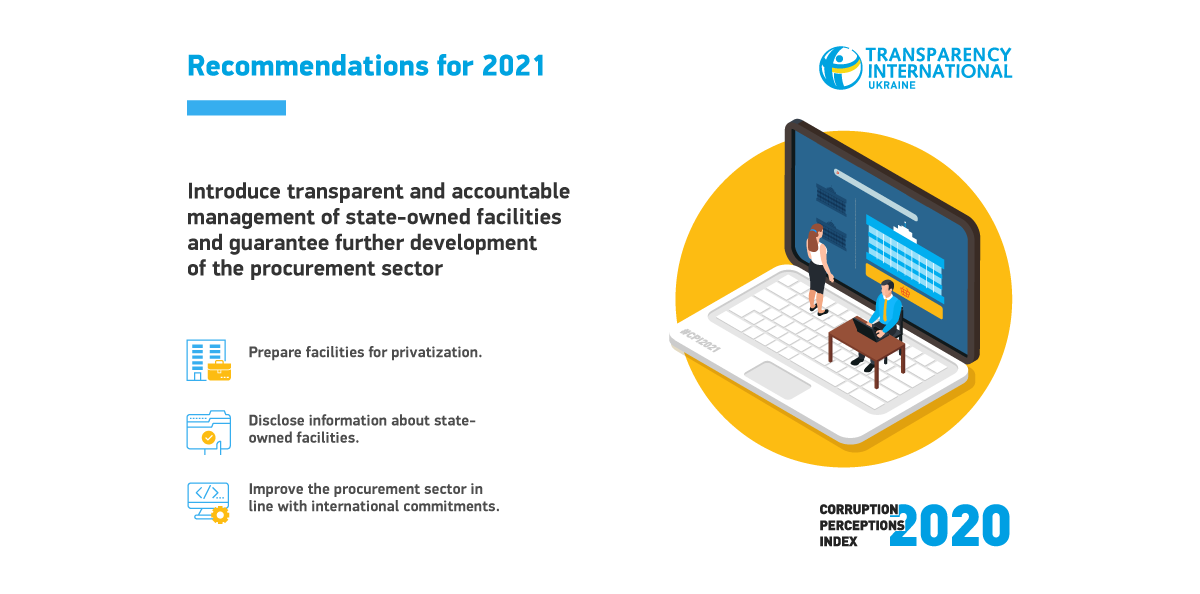

World trends of 2020
CPI is important because it allows you to compare data from different countries using a single approach. And this approach does not take into account the specifics of each country but considers the global context.
Since 2012, 26 countries have significantly improved their performance in the Index (e.g., Ecuador, Greece, Guyana, Myanmar, and South Korea), and 22 countries have significantly reduced their performance (e.g., Lebanon, Malawi, Bosnia, and Herzegovina, Malta, Poland, and Guatemala). The performance of nearly half of other countries has not changed over the past 10 years, indicating a halt in governments’ efforts to tackle corruption’s root causes.
СРІ 2020 found that persistent corruption undermines health care systems and promotes a retreat from democracy in the wake of the COVID-19 pandemic. Over the past year, reports of corruption during the pandemic have spread across the globe, from bribes for testing and treatment to public procurement of medicine. During a pandemic, governments’ measurements often lacked transparency, restricted civil rights, and served the private interest rather than the public good.
It is noteworthy that countries with widespread corruption are the least prepared to deal with such crises. However, a fair recovery can be achieved if decisions are made in the public interest rather than powerful players.
Instead, countries with high CPI scores invest more in health care, make it more accessible to all, and are less likely to violate the rule of law or democratic norms or institutions in response to the crisis.
Transparency International has developed global and universal recommendations for all governments to reduce corruption and respond more effectively to future crises.
It is required:
- to ensure the independence, capacity, and funding of oversight and anti-corruption institutions so that resources reach those who need them;
- to ensure open and transparent contracting to combat wrongdoing, identify conflicts of interest, and ensure fair prices;
- to protect democracy and promote the development of civil society to create the conditions for accountability of governments;
- to publish relevant data and guarantee access to information so that the public receives simple, accessible, timely, and meaningful information.
The performance of nearly half of other countries has not changed over the past 10 years, indicating a halt in governments' efforts to tackle corruption's root causes.
CPI research: how it works
The Corruption Perceptions Index (CPI) is an index compiled by the global organization Transparency International since 1995. The organization itself does not conduct any surveys. The index is calculated based on 13 studies of reputable international organizations and think tanks.
The key indicator of the Index is the number of points, not the place in the ranking. The minimum score (0 points) would mean that corruption effectively replaces the government, while the maximum score (100 points) would indicate the near-complete absence of corruption. The index only assesses corruption in the public sector.
CPI includes the point of view of business representatives, investors, market researchers, etc. It reflects the private sector’s point of view and its perception of corruption in the public sector.
It is important to remember that the CPI measures perception itself, not the actual level of corruption. Comparing a country with a higher score to the one with lesser does not mean that the former is less corrupt than the latter. This means that the former is perceived as less corrupt.
The CPI methodology has received a stamp of approval from the European Commission for its reliable statistical approach.
CPI covers the perception of corruption in the public sector by experts, in particular: bribery; embezzlement of public funds; nepotism in the civil service; seizure of state power; the government’s ability to implement integrity mechanisms; effective prosecution of corrupt officials; excessive bureaucracy; availability of appropriate laws on financial disclosure, prevention of conflicts of interest and access to information; ensuring the protection of whistleblowers, journalists, and investigators.
Why CPI?
– CPI covers more countries than any other single source.
– CPI compensates for the error in different sources, using the average of the results of at least three different sources.
– The CPI scale from 0 to 100 is more accurate than other sources, as some have a scale of 1 to 5 or 1 to 7, so many countries get the same results.
– The CPI balances different perspectives on corruption in the public sector and has a neutral approach to different political regimes.
For reference
Transparency International is an anti-corruption organization founded in 1993 in Berlin by Peter Eigen, former director of the World Bank. Delia Ferreira Rubio is currently the chairman of the TI board. Transparency International is found in more than 110 countries of the world. The organization is best known for the Corruption Perceptions Index and the Global Corruption Barometer. According to the Global Go To Think Index Tank Report for 2017, Transparency International ranked 3rd out of 143 independent think tanks in the world. And in first among 67 world analytical institutions dealing with the topic of Open and Good Governance.
Transparency International Ukraine is an accredited chapter of the global movement Transparency International with a comprehensive approach to the development and implementation of change to reduce corruption.
TI Ukraine administered and transferred the ProZorro, ProZorro.Sale and eHealth systems to the government. Our innovation and expert center has also implemented the City Transparency Ranking and is building the DOZORRO community to monitor public procurement.
Media contacts: Olesia Koval, [email protected], 093-808-82-78.
It is important to remember that the CPI measures perception itself, not the actual level of corruption.
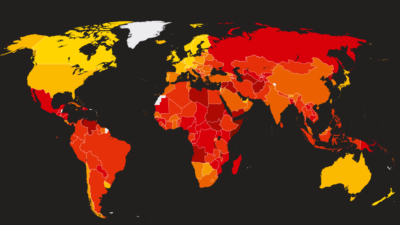





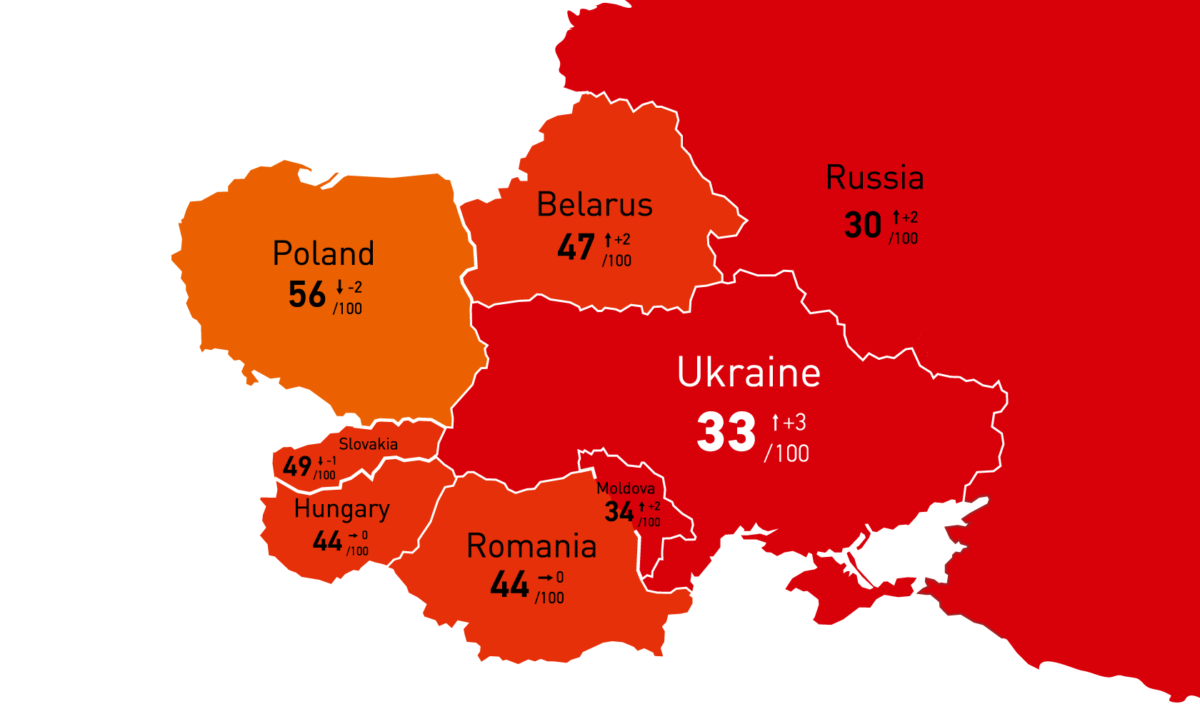
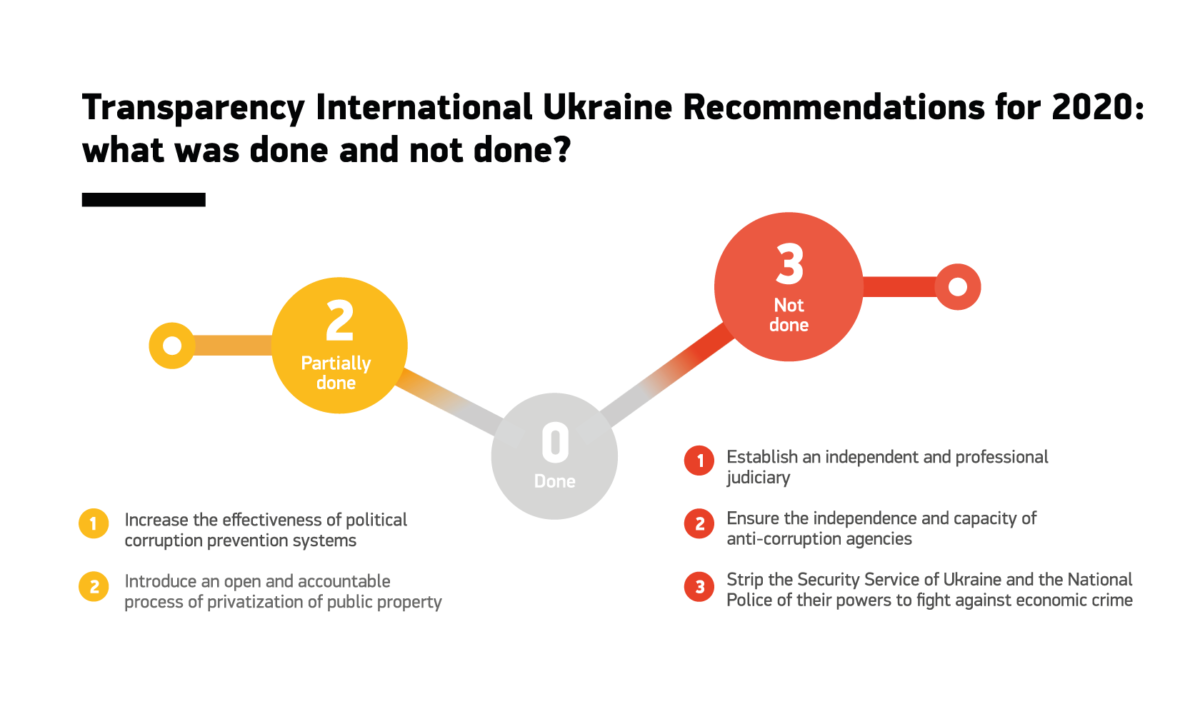
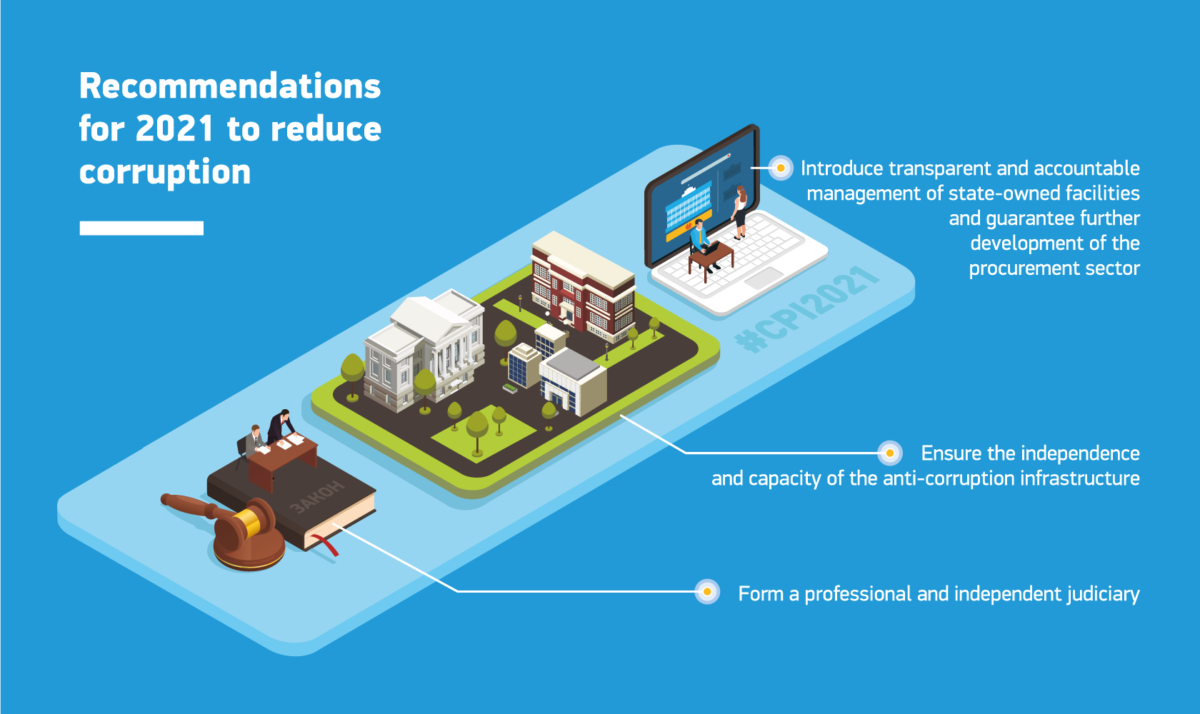
 Download .pdf
Download .pdf

